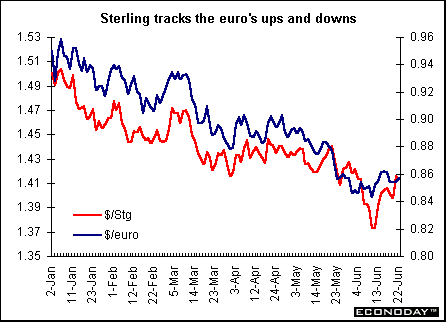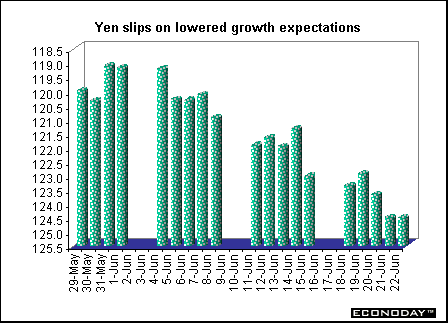
Currencies
The British pound sterling lost 4 percent of its value against the euro during the first 12 days of June on speculation the government, which was re-elected on June 7, would move quickly to join the euro. But the pound bounced back after Bank of England Governor Edward George said that the exchange rate would need to come down before that could happen. Sterling continues to shadow the euro in its downward trajectory against the dollar as illustrated in the graph below. The pound and the euro move in tandem because of the trade relationship between Britain and the EMU, as well as on expectations that the British government will attempt to join the EMU. About 60 percent of the Britain's exports go to the euro region. Some say sterling may need to decline as much as 20 percent against the euro to ensure export competitiveness in the event that Britain joins the euro.

Although the euro eventually edged up on the week, it continues to be hammered by weakening economic activity. Several research institutes or "wise men" scaled back their forecasts of German growth and some officials even began to warn of a possible German recession because of the steep plunge in manufacturing orders and production. Indicators in France as well as Germany are pointing down. Yet despite the spreading gloom, the ECB chose to leave monetary policy unchanged once again.
The biggest contributor to the downward push on the yen came from indications that the United States would not object to further weakening of the Japanese currency. White House economic advisor Lawrence Lindsey said that while deliberate depreciation would not be acceptable, a market change in the value of the currency because of structural reforms would be acceptable. At the same time, monetary officials said that a policy of intentional depreciations was not proper and they would act to counter any sharp downward drop. It seems as though both Washington and Tokyo want the markets to take the yen lower as long as it's done in a stable manner. In fact, the yen rose against the dollar Friday after Finance Minister Masajuro Shiokawa said he was ready to ask the Bank of Japan to intervene against excessive moves in the currency.



Introduction • Global Stock Market Indexes • Recap of Global Markets • Currencies • Indicator Scoreboard

The Bottom Line • Looking Ahead
|